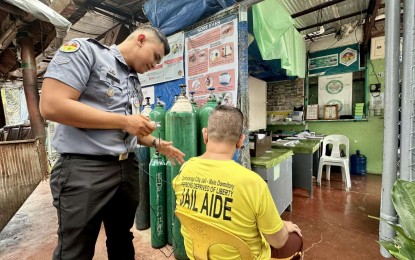
CARING FOR PDLs. An inmate at the Zamboanga City Jail Male Dormitory (ZCJMD) avails himself of physiotherapy services on Monday (March 4, 2024). The ZCJMD's facility has basic medical equipment for physical rehabilitation such as parallel bars, transcutaneous electric nerve stimulation devices, resistive bands, dumbbells, and cones with one licensed physical therapist and a nurse. (Photo courtesy of BJMP)
MANILA – Persons deprived of liberty (PDLs) at the Zamboanga City Jail Male Dormitory (ZCJMD) who need physiotherapy services can now be treated at the jail following the opening of its physical rehabilitation facility on Monday.
In a statement, ZCJMD warden, Jail Supt. Xavier Solda said PDLs need not wait to be cleared by the court and be lined up in a government hospital for weeks to avail physical therapy services.
The services also cover PDLs' qualified dependents.
“Our unit is putting all efforts into providing the best kind of health services our PDL rightfully deserves. Humanizing jail conditions include a non-stop pursuit for health solutions not just addressing the jail congestion,” Solda said.
He said the facility has basic medical equipment for physical rehabilitation such as parallel bars, transcutaneous electric nerve stimulation devices, resistive bands, dumbbells, and cones with one licensed physical therapist and a nurse.
The facility is also one of the long-term solutions to the limited manpower complement of the unit which depletes once a PDL needs to be brought to the hospital for physical rehabilitation especially if the latter is classified as high-risk.
It also helps to speed up the recovery of the PDL patient since they can avail of the needed therapy sessions on time, without worrying about the availability of court orders or a slot for physical therapy sessions in a government hospital.
Solda said the creation of physiotherapy services in the unit is inspired by the discussions during the recent International Corrections and Prisons Association Conference supported by the United Nations Office on Drugs and Crime wherein various creative solutions on different challenges in prisons and other places of detentions were discussed.
Meanwhile, Bureau of Jail Management and Penology chief Jail Director Ruel Rivera lauded the jail's management for the initiative to build the bureau’s first physiotherapy services facility.
“Promoting good health among our PDL is indeed our priority to ensure their welfare and physical wellbeing while under our care. We hope to create more health facilities through the support of our partners as we continue to improve our service delivery to our clientele," he added. (PNA)
